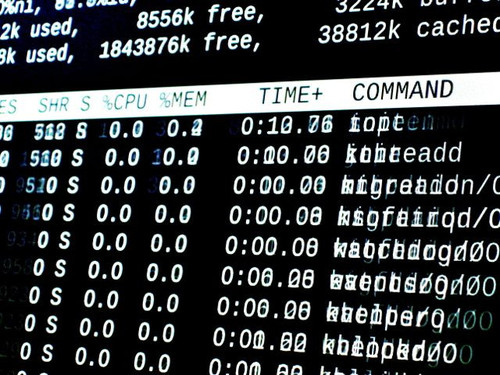Travis wanted, at that moment, to be looking at anything but what he was
seeing then. It wasn’t that the logs on his screen were long and dry –
well, yes, they were, but that was something he was used to looking at
day in and day out. No, this was anything but boring, and not in a good
way.
“Javier,” Travis called over to the other side of the office. It was
already past 6:00, and most everyone else had already cleared out of the
networking cluster. “Could you look at this? I want to make sure I’m
reading this right.”
Unlike his remaining co-worker, Javier still seemed to have some life in
him. He’d been at this job for three years already, but you couldn’t
tell by looking; he still had the energy of someone who hadn’t even yet
graduated from college. It was that cheerful innocence that enabled him
to walk over to Travis’ desk with an excited smile, oblivious to the
hint of dread in his colleague’s summons.
“This server,” Travis said, pointing to a highlighted entry on his
screen. He paused for a moment, snapping his fingers as if they were the
ignition to his idling brain. “Sterling oh-eight here… that’s an
encrypted file storage node in Houston, right?”
“Yeah, I’m pretty sure it’s high clearance,” Javier added, in a
matter-of-fact tone.
Travis’ finger slid further down the line of text on his monitor,
stopping underneath the name of the transmission protocol.
He threw a glance in Javier’s direction, seeking confirmation for what
his strangled intonation indicated he already knew.
Javier, however, seemed largely unfazed by the news. He simply responded
to Travis’ question with another.
Continue reading
“Lassie? He hasn’t been in for… uh, I mean, since Monday.”
The smell of coffee in the lab was overwhelming, even to Peter, and he
basically lived on the stuff. True, there wasn’t all that much else in
the place that could give off a distinctive odor; this was a physics
research workspace, not an auto repair shop. Still, it was enough to
give him visions of being an inch tall, nearly drowning inside a coffee
mug. A radio in the corner of the lab was running down the latest
headlines, one of which was the announcement that their agency – NASA –
had successfully landed the new probe Virtue on a low-period comet.
Unfortunately, a camera malfunction meant that photos and video were not
yet available, and might not ever be.
“Is he sick, or on leave, or…?” Peter trailed off.
The bespectacled woman in a lab coat looked away for a moment – Come to
think of it, why do the people down here wear lab coats? It’s not like
physics is particularly messy, Peter thought – and then turned back to
meet his gaze. “I don’t really know,” she said. “He… just didn’t show
up. It’s been three days now, and we haven’t heard anything from him.”
Peter couldn’t help but sound a bit agitated. “Nothing at all?”
“No. The only thing I can think of is that his anniversary is coming up,
but he’s never taken off for it before.”
“You think he just up and went on vacation?”
The woman flinched slightly, as if Peter were about to deal her a
physical blow, but his stance hadn’t changed one iota.
“It’s not that. His wife died a little over three years ago. Hit by a
stray bullet during a police shootout.”
“Oh,” Peter said, with a sound more like a strained exhalation than
human speech. “I’m sorry.”
“They’d only been married six months. It… was just too soon, and he
really took it hard. This time of year was always rocky for him, but not
to this extent. I think Doug tried to get in touch with him yesterday,
but as far as I know, nothing came of it. I’m starting to get really
worried – who knows if he’s gone and done something stupid or –”
“I’m sure he’s okay,” Peter interrupted. He didn’t really mean it, but
he’d take an empty assurance over being forced to come to terms with a
stranger’s problems any day.
The woman stopped, taking a deep breath. “You’re right… this – no – I’m
sorry you had to see that. But I honestly don’t know where he is right
now, or what might have happened to him.”
“Okay. Thank you.” A curt nod.
On his way out of the lab building, Peter stopped by a vending machine
and bought a cheap soda. He wasn’t a fan of carbonated drinks, but they
were still better than stale coffee.
Tim Lassiter sat hunched over his laptop, the backlit display serving as
the only significant illumination in the otherwise darkened hotel room.
The only sound to be heard in the room was the press and release of a
single key in an insistent beat.
Tap, tap, tap, tap…
His breathing was perfectly still, devoid of the rhythm that
characterized a typical living person. Definite bags had formed beneath
his eyes, which looked simultaneously crazed and tired, bloodshot and
glassy, impatient and exhausted. His hair was tied in unkempt knots, and
he clearly had not shaved in several days. But none of that was material
any more. The only one that could have seen the state Tim had sunk to
was Tim himself, and he no longer had eyes for anything but the frames
flicking past on his computer screen.
Tap, tap, tap, tap…
The images Tim was paging through were not themselves labeled, but a
series of cryptic filenames flashed in the title bar: Virtue ccd devA
00583 104855 20211016 b, c, d, e, f…
He’d known, when he first copied them to his computer, that what he was
doing was against every rule on information security that he had ever
had drilled into his head. And he’d been sloppy in his haste to transfer
the files, definitely enough to lead anyone who wanted to find the
culprit straight to him. But once he’d laid eyes on the images
themselves, none of that mattered to him any more.
Tap, tap, tap, tap…
The photos were somewhat dark and a little shaky, but the artistic
quality was of no concern. Rocks and dust ringed the edges of the
picture, as if they were merely a decorative frame. At the center was a
block of ice, pebbles suspended in its frozen substrate, and buried
about a meter from its surface was a single perfectly preserved human
body, one that looked like it belonged to a woman in her late twenties.
The way she was encased in the ice made her appear to be in nothing more
than a deep slumber, eyes closed and a look of tranquility on her face.
Her arms were spread wide, as if about to embrace an invisible figure,
and immediately below her right breast was a knotted scar, like that
left from a bullet wound.
The tapping stopped. Tim had finally slumped over in his chair, his long
reverie coming to an end. As his eyelids slowly shut, a hoarse whisper
escaped from his mouth. The name “Gina” seemed to extinguish itself
right as it became audible, the last flickers of a longing candle that
had burned all the way to its end.
Anonymous writes:
I’m not really sure what kind of question to ask, so I think I’ll go
for more of a prompt. In an attempt to better understand the nature of
the universe and of celestial bodies, NASA has sent out a probe to
sample the core of one of the oldest known comets. At the core, rather
than ice and intergalactic dust (pardon the scientific inaccuracies),
they find a human in slumber. What is the story?
The winner of my keyboard-mash fiction
challenge.




